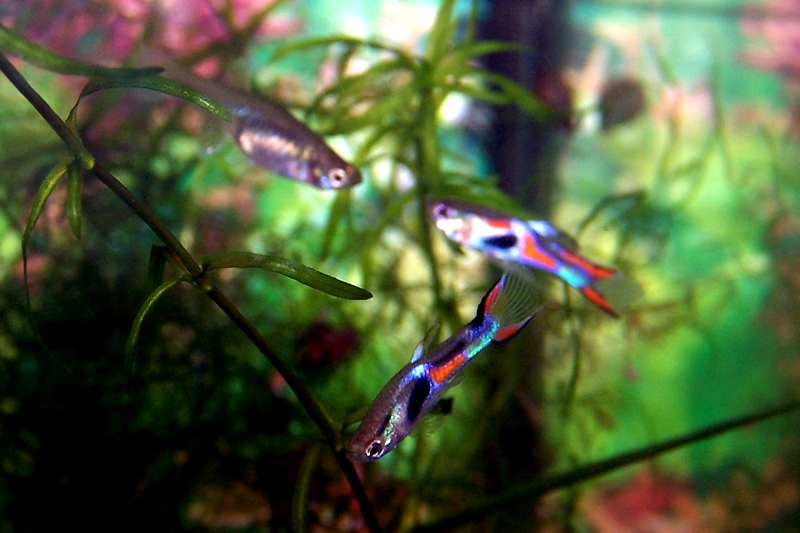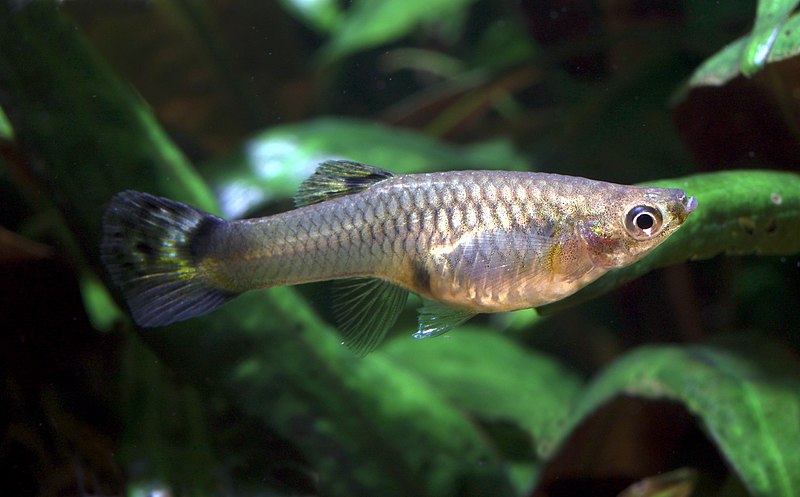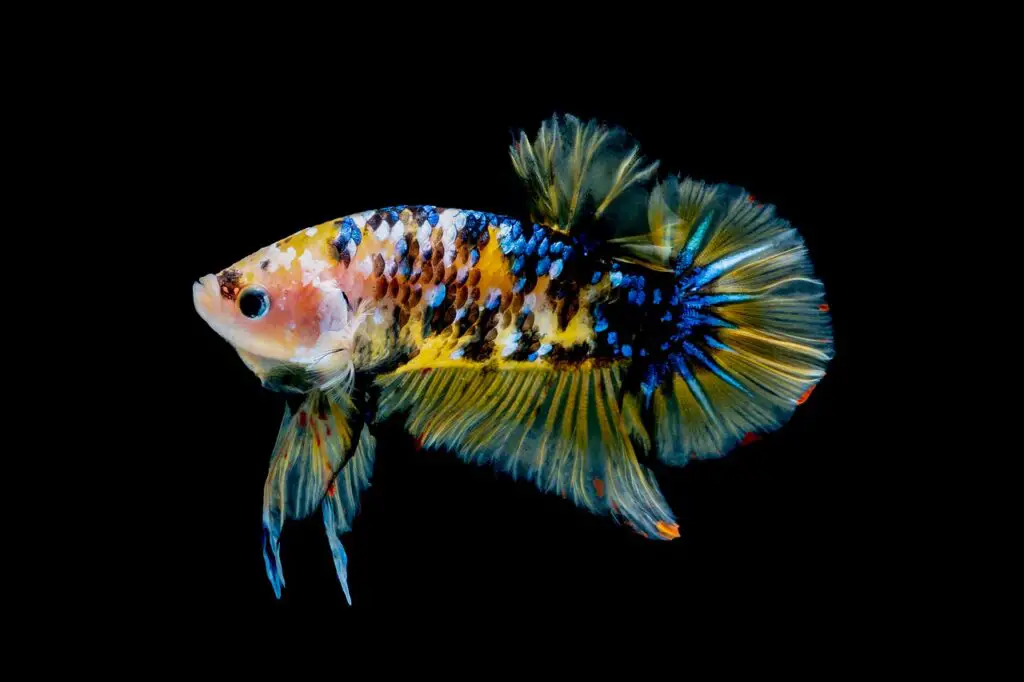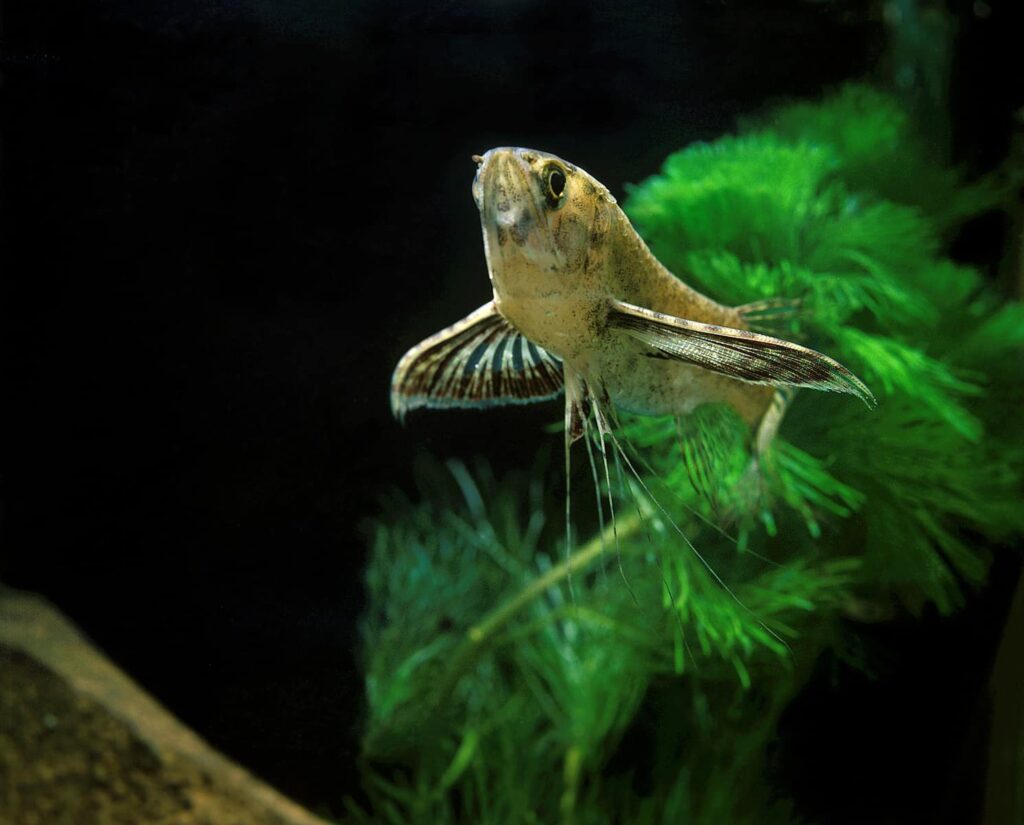Guppy (Poecilia Reticulata)
Ever looked after guppies before? Our guide below provides you with information on how to raise your guppies and ensure they are happy with their tank companions.

Poecilia reticulata come in several amazing colour combinations, including the Red Flamingo Guppy which is an ideal fish for beginners to fish keeping – though it’s also widely enjoyed by experienced keepers. There are some nuances between the various types of Poecilia reticulata, mostly to do with colour and price, so choice is usually based on your budget and colour preference!
- Fish Lifespan: Varies
- Tank Size: At Least 20 Gallons
- Water Temperature: Between 64F and 82F
- pH: Between 5.5 and 8.0
- Hardness: Between 8 and 12 dGH
- Compatibility: Compatible with Minnows, Discus and Bettas
- Fish Size: Up to 3 Inches
How do you take care of a Guppy?
Guppies are famously easy to look after, though as with other tropical species, they will need to thrive in the right tank and water conditions. That’s why it’s so important to do a little bit of homework before you get started!
Guppies tend to be pretty mild mannered, so providing you line them up in your tank with fish and critters of a similar temperament, or if you have fish of a similar size, you likely won’t have much of a problem raising them.
Of course, you should always pay close attention to the specific diet of a guppy, too! It’s all too easy to imagine that all your fish will guzzle down the same treats.
Providing you look after your guppies properly, they tend to breed fairly quickly, meaning they are ideal for growing your own community. Again, however, be careful when it comes to introducing other fish to the same tank as a guppy or two, too! Keep reading for more details a bit further down.
How many Guppies can be in a tank?
In a 20 gallon tank, up to 12 Guppies can thrive, but take caution regarding breeding and thereby overpopulating the tank! It’s always a good idea to aim for a larger tank wherever possible, as this means you can then account for more fish if they come along.

Most Guppies are happy in the right conditions and seldom shy away, unless threatened. They are perky and entertaining to watch, when on good form. Depending on the size of the tank, several of this species can share the same home.
Do Guppies die easily?
Guppies will die if the water in your aquarium is too hot, too cold or of poor quality. Offspring can be eaten very quickly, depending on other available food. It seems this is why so many guppy children are born as the odds increase for a number to survive!
Guppies are peace loving fish, and do not stand up well to aggressors in the tank. It is best to provide some shelter or plants for the fish to hide, if you feel your fish are being threatened. Guppies can die of starvation, too, if more combative fish snatch all the food! If possible, it is best to avoid housing more aggressive fish with your Guppies.
Why do Guppies breed so much?
Guppies certainly breed easily! Again, it’s thought this may be as a result of their survival rate in the wild, it’s an evolutionary trait. One pair easily breeds up to dozens of fish relatively quickly! It is worthy of note that Guppies may eat their own offspring, too.

They give live birth to their offspring rather than lay eggs. As females can breed every 30 days, it is best to have a ratio of fish you can easily manage! The Guppy’s gestation period is up to 30 days, and between 1 to 100 offspring can arrive at once!
Usually females give birth to between 20 and 30 offspring. It is usual and preferable to have more females in a tank than males, and often people find that one male is enough! With no competition for the females, he is usually pretty happy, too!
How often should Guppies be fed?
This can vary from one to three times per day. As water quality is of primary importance to these fish, it is recommended to feed an amount which can be eaten in up to 5 minutes. This avoids residue decaying in the water, which causes contamination and the fish to suffer.
The more fish in the tank, the more competition for food – and the faster food is eaten. Therefore, some owners feed at intervals during the day, rather just offering one meal.
Please refer to notes below regarding Guppies requiring light at night. This explains why feeding your fish just prior to switching off lights is dangerous!
What is the rarest Guppy?
Known as the ‘Snakeskin Guppy’, this flourishing fish is one of the rarest of its kind, especially so if tail and dorsal fins match!

One of the most dramatic and favoured colours sought by collectors is blue, but these fish come in an amazing array of colours and combinations. These include bold red, blue, yellow and white, to more subtle blends and shades.
Fins vary in size, and some of these fish appear to be slenderer than others, with more elongated, streamlined bodies, whilst others have shorter body lengths. These Guppies are usually the most expensive to buy and may need special orders in advance!
Do guppies need light at night?
Guppies need periods of light and dark. Too much light would over-stress them. 8 to 10 hours’ darkness is recommended.
However, be careful feeding your Guppy too close to lights out. If fish are unable to see all the food, some of it will settle in the tank, on the bottom, or on plants or rocks. This may slowly decompose and adversely affect the quality of the water. This may cause unpleasant and perhaps devastating conditions for your fish – some may become sick and/or die from contaminants in the water.
Aquarium owners often find that, if they time the lighting of tanks to coincide with regular daylight hours, this tends to be the best rhythm for their Guppies and other fish. Like most animals, they have a ‘Circadian Cycle’, so they benefit from a period of darkness in which to sleep!
Can Guppies live with bettas?
Yes, however Bettas are more aggressive than Guppies, and though they can share the same aquarium, it is highly recommended that your placid Guppies can find places in the tank to take refuge!
The more space these fish have the better – and sometimes, if the aquarium is too small to house the fish, the Bettas will become particularly aggressive and attack the Guppies. However, if there is sufficient space and food, they can live in relative harmony.
What is the best fish food for Guppies?
Guppies are omnivores. They are relatively easy to cater for and it is widely acknowledged that well-fed Guppies, like most fish, live longer than those on a meagre or unsuitable diet.
A wide range of food is available in pellet or flake form, to be purchased at pet supply shops or ordered online. They are particularly partial to shrimps!

The diets of Guppies can affect their colouring as much as food quality affects their general health and that of the water! In their natural habitat, Guppies eat larvae from insects and algae. Their diet is normally varied and interesting as a result.
Guppies thrive well on spirulina and may also eat very finely chopped/grated greens such as peas, spinach or zucchini. They enjoy a variety of things, and so vegetarian flakes and pellets can be combined with shrimp and other meat proteins. The latter are sometimes sold in freeze dried form, which makes it easy to store and distribute.
You will soon get to know which is the favourite of your fish and that which they do not reach for so enthusiastically! Just as we enjoy and benefit from variety, so do they! It gives them more interest and a wider variety of nutrients.
Should I get a Guppy?
Guppies remain some of the most popular fish for brackish waters. That’s because they are often so easy to look after, and not only that, but they are also very colourful and fun to watch. Yes, as with other fish, you are going to need to make sure you provide the best possible conditions for them. However, even if you are a beginner at owning a tank, you’ll likely find this to be a choice of fish you can really grow with.
However, again, do be careful when keeping Guppies that you don’t keep them in a tank too small for their breeding needs. After all, these are fish that really will propagate quickly if you let them! Therefore, as with all fish, brackish or otherwise, it’s generally a good idea to go for a bigger tank whenever and wherever you can.
So yes – if you’re just getting up and running with a brackish tank, a guppy is a great pick!



